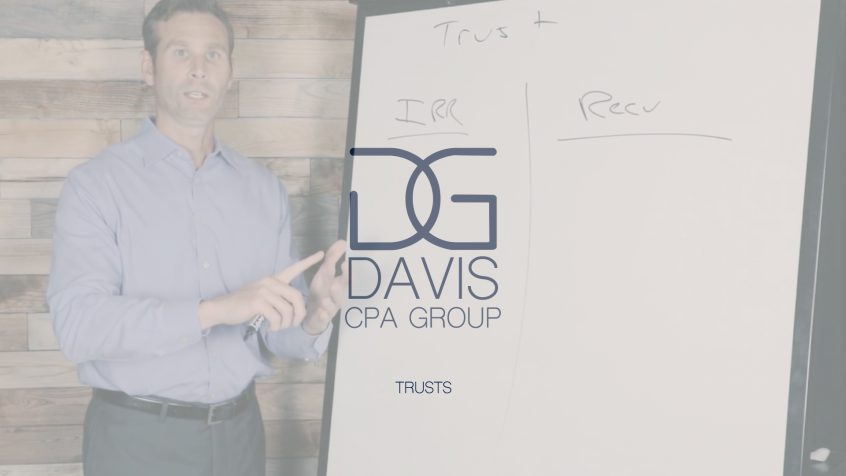Brandon Davis of Davis CPA Group in Joplin, MO, discusses trusts in terms of taxation, revocable trusts and irrevocable trusts.
Hi, Brandon Davis again, with Davis CPA Group. I’m going to elaborate a little bit more on trusts, talking about the taxation of trusts, talking about revocable trusts, irrevocable trusts, and what that means.
In the past, in a previous video, I talked a little bit about estate planning, as far as different types of estate planning vehicles, from the standpoint of wills, and trusts, and the transfer of death, or beneficiary designations. So today, I want to talk a little bit more about trusts, and dive a little bit into a little bit more of what happens when someone passes away, to their assets, if I inherit something, and do I pay tax on it? Some general questions I usually get hit up with.
So we’re going to talk about trusts today. And we’re going to talk about irrevocable trusts and revocable trusts. The key difference between the two primarily, is that an irrevocable trust, once I establish it, once I transfer my assets to that trust, it can’t be changed. And so the beneficiaries I name, the assets, once they’re transferred in there, I lose control over, and a lot of things that happen once you put things in a trust that are final.
I generally recommend my clients when they’re looking at doing some estate planning with trusts, particularly if they’re younger in age, to go ahead and go with a revocable trust. This allows them to get things set up, get their affairs in order, establish who they want their beneficiaries to be, how much they want to leave to their beneficiaries, and really put themself in a good place, but also be able to change that because things change.
One of the things that a lot of people will do, they’ll put together a trust agreement, they’ll get everything funded, meaning they transfer all the assets into the trust name, houses, cars, investment accounts. Maybe not cars, and we’ll talk about that a little bit later because that could be a risk issue. But certainly houses, investments, and different assets that you want to transfer to your heirs.
One thing about trust, it does avoid probate. I talked a little bit more about probate in one of my other videos, which there’s a link below for that. But it does avoid probate, which allows a little more simplification in the process of getting your heirs or their assets. And so once I establish a trust agreement, I put in all my assets in this trust agreement, and then I list my beneficiaries. And the nice thing about a trust over a will, it allows you a little bit more ability to be very specific on how you’re going to give things.
Maybe you want to give 10% of your estate to one child and 90% to the other because the other one was there for you in the end. Or maybe you want to split it 50/50. Whatever you want to do, it’s a very personal decision, and it’s one that does take time to go through and figure out, both with your accountant and your attorney. So you’ll have to get them both involved, get your team together, and get the document established how you want.
But then you can’t just forget about it. You got to revisit it every now and then just to make sure, “Are these the wishes like I still want? Have some of my heirs passed away? Have something happened to my family where I need to restructure some things? Has there been a remarriage or a divorce in my heirs that we might want to think about when we’re structuring who’s going to get what?” So those are the things you need to think about.
When it comes to taxation, I’m going to focus more on the revocable trust right now and what happens when someone passes away. So say, for example, I’ve got a trust that I’ve established and I pass away. And so within my trust, again, while I’m alive, it’s a revocable trust. I do a lot of abbreviations if that’s okay. I don’t spell well, so I figure if I abbreviate, you guys don’t know anything better about than I do.
So anyways, we go through here, if I’m alive and I put all my assets into a trust, I may have an investment account, and I have my house, and I have, let’s say I have a farm, and maybe some other assets that have appreciated in value. I want to transfer ownership to the trust of all those assets. While I’m alive, the trust, while it’s a separate legal entity, it’s completely ignored for tax purposes. It’s considered what’s called a grantor trust. And during that grantor trust status, the trust doesn’t need a tax ID number.
Now sometimes banks will want one to open a big account such as a trust, but nine times out of 10, when it’s a revocable living trust, meaning I’m alive, I’m in control, I set it up, my assets are in there, I can just treat it as if it doesn’t exist for tax purposes. I even kind of treat it as if it doesn’t exist for legal purposes, except for the fact that my assets are titled that way. And so if I pull money out of my bank account that I’ve got in my trust, no problem. If I sell my house, buy another house, just transfer the one in the trust, no problem.
Investments, again, you can liquidate and do whatever you want with those. Now when my investments kick out income, or my bank account kicks out interest, or whatever might be in the trust, generally, it’s income back to me because maybe I put my business ownership in the trust. That’s completely fine. I don’t spell very well here. As that income comes back to me, it’s reported on my personal tax return as if the trust never existed. And so that’s that grantor feature of this revocable living trust.
Now at the point that I die, it becomes irrevocable, can’t change it. He’s dead, he’s the guy that started it, can’t go back. So what happens at that point is, the successor trustee, who’s normally the person after I die, maybe my spouse, maybe my kid. They’re going to step in, they’re going to look at my trust agreement, and they’re going to go through that and abide by my wises, and distribute assets out to the beneficiaries.
Well, one of the things that I get questioned on often is, “Okay, I’m the beneficiary of a trust. Is that money that I’m getting going to be taxable to me?” Well, I always answer questions like that with answers like this, “It depends.” That’s the safe answer. But really, nine times out of 10, there’s not usually a tax implication of monies that you inherit, unless they’re certain types of inheritance. For example, IRAs. I’m going to talk about that in a bit.
Generally speaking, what happens is, in a trust situation, I’m really going to simplify this because trust situations can be more complex than this. By the time of my passing, say I had an investment account that was worth a $100,000, that I had invested 50,000 in over time. So that was my basis. A lot of times what happens during a lifetime, you guys, some of my clients, and many of you watching this video are familiar with buying and selling stock, and having investment portfolio. Well, as you buy stock for X number of dollars, it goes up in value, you sell it, you’ve got a gain or loss.
You pay tax on that, you get what’s called a 1099 from your investment brokerage company, and you report that. Well, this is a similar situation. This is a stock investment account that I had a $100,000 fair market value at the date of my death, DOD, Date of my Death. And I had 50,000 I had invested over my lifetime. That becomes important here in a minute. I’ve got a house in my trust. Say, my wife had preceded me in death, I’m left with my trust, I own the house, and the house is worth a $150,000 today, at the date of my death. And I bought it really well, and I bought it for $50,000.
So it’s my basis in the house. Unfortunately, I don’t have a farm. I just put that on there as listing things that we may have to put in a trust. Say, I got a bank account that’s got 10,000 in cash in it. Well, the basis and fair market value is always the same in cash. And say, I’ve got a business. Matter of fact, we’ll just ignore the business at this point to just keep this example simple.
A lot of times, what will happen is, when someone passes, and they’ve got a revocable trust in place, at the date of my passing becomes irrevocable. Well, you may have a heard a term called a step-up in basis. Whenever I pass away, and I die, my heirs get a step-up in basis to the fair market value at the date of my death. Meaning, if at the date of my death, I had a $100,000 fair market value in this investment portfolio, my heirs over here of the trust, their basis now goes up. So now, it goes to a $100,000. On the house, it goes to a $150,000. On the cash, again, cash is cash, and so it’s going to be 10,000 either way you cut it.
So if they turn around within a very short period of time after my passing, liquidate everything, sell all the stock, sell the house, get the cash. Then you can see here, my fair market values, as you add those up, you’ve got 100, then makes it 250, $260,000 in fair market value against $260,000 of basis. So the tax implications once everything’s liquidated is actually zero for those heirs.
Now there’s a lot of things and a lot of other types of assets that one could inherit that would be taxable, but simply talking about invested assets, a house, and things of that nature, you get a step-up in basis to the fair market value at the date of that person’s passing. Again, a very simple example, not one that has a whole lot of complexity to it because there are certain vehicles that, unfortunately, no matter what, are going to be taxed as inheritance. And one of those are IRAs. And so I want to tough on that briefly before we wrap up.
One of the things I tell my clients often is, “If you’ve got an IRA, or some other taxable, potentially taxable account, like an annuity and what have you, that you’ve purchased with pre-tax dollars in the past.” For example, a 401(k) they’ve rolled into an IRA, and now it’s money that would be taxable as they take it out, you generally want to avoid putting that in a trust. And the reason I say that is, there’s certain rules that wrap around IRAs, rules like required minimum distributions, and things of that nature, and people hit a certain ages, that allow for some tax planning opportunities when someone inherits those, that can be a little bit more tricky when they go into a trust.
So in one of my previous videos, I talked about TOD designations I always tell my clients, “Don’t put an IRA in a trust. Just do a TOD designation on the percentages that you want to allocate to those beneficiaries, and they’ll get to inherit that.” An IRA is one of those things, that when I inherit it, it is going to be a taxable event to me, as the beneficiary because that money was deducted in the past by whoever put it in there. And so as they take it out, it would be taxable to them. So if I step into the previous owner’s shoes because they passed away, any monies I pull out of this IRA are going to be taxable to me.
A lot of times though, when someone does inherit an IRA, they’re usually up in age. They’re usually over this magic number called 70 and a half. When I reach 70 and a half, I have to take money out of my IRA and those are called required minimum distributions. Well, if I pass away, I’m 74 years old, been taking my required minimum distributions for a while, try to say that fast, you’ll get tongue-tied, too. When you go through that and my kids inherit the IRA, they’ve got to continue to take these RMDs over my life expectancy that I had.
Or, there’s an option for them to potentially reallocate those over their life expectancy, which would bring down, potentially, the amount of the RMD that got take out. So there’s some tax planning that goes on when you inherit IRAs when there’s RMDs in place. You certainly could take it all in one check, lump sum, as soon as I kick the bucket. “Hey, dad’s gone. I want that money. I’m going to go spend it on a new car. Thanks, dad.” That’s going to be taxable income to them when they pull it in all in one year.
So if it was my kids that did that, I’d probably roll over in my grave, be very unhappy with the fact that they did poor tax planning by blowing it all in one year. So anyway, that’s a little bit touch on trust, and how they’re taxed when things happen, when you pass away. We’ll have some more videos along this line. Please comment below with any questions you have about this or any other topics related to this that you’d like to hear. And we’re happy to put those on a video.


